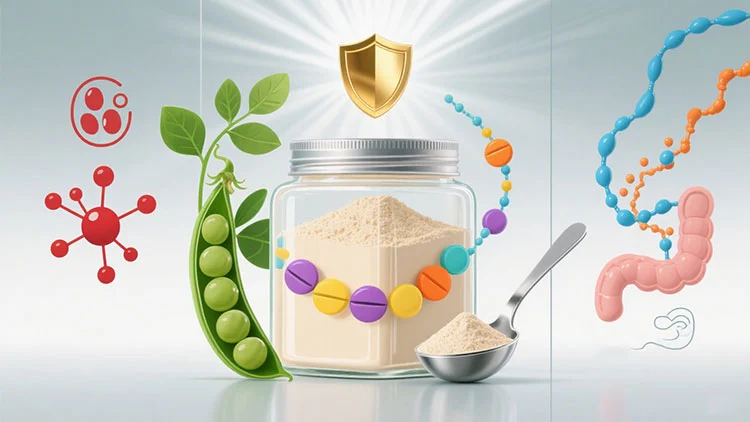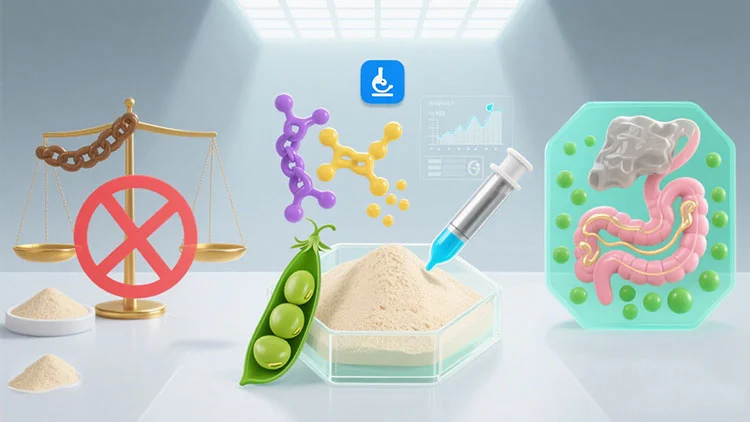What Nutrients Define High‑Quality Pea Protein Powder?
Pea protein powder has emerged as a popular plant-based protein source, gaining traction among health-conscious consumers and athletes alike. But what exactly defines a high-quality pea protein powder? The answer lies in its nutrient profile and overall composition. High-quality pea protein powder is characterized by its protein concentration, amino acid profile, digestibility, and additional nutritional enhancements. It should provide a complete protein source with all essential amino acids, have a high protein content (typically 80% or more), and be easily digestible. Moreover, premium pea protein powders often include fortifications such as iron, B-vitamins, and digestive enzymes to enhance their nutritional value. This article delves into the key nutrients and factors that distinguish top-tier pea protein powders, helping you make informed choices in your quest for optimal nutrition and performance.
Protein Concentration Standards: Why 80%+ Purity Defines Premium Pea Protein Powder?
The Importance of Protein Concentration
The protein concentration in pea protein powder is a crucial factor in determining its quality. High-quality pea protein powders typically boast a protein content of 80% or higher. This level of purity ensures that consumers are getting a concentrated source of protein with minimal additional components. The higher the protein concentration, the more efficient the powder is in delivering the necessary amino acids for muscle building, recovery, and overall health. Pea protein powders with 80%+ purity are often preferred by athletes and fitness enthusiasts who require a potent protein source to support their training and recovery needs.
Processing Methods for Achieving High Purity
Achieving a high protein concentration in pea protein powder requires sophisticated processing methods. Advanced techniques such as wet milling, isolation, and spray drying are employed to extract and concentrate the protein from yellow peas. These processes effectively separate the protein from other components like carbohydrates and fats, resulting in a powder with high protein purity. The use of cutting-edge technology in processing ensures that the final product maintains its nutritional integrity while achieving the desired protein concentration. Manufacturers of premium pea protein powders invest heavily in these processing methods to deliver a high-quality product that meets the 80%+ purity standard.
Benefits of High Protein Concentration
The benefits of choosing a pea protein powder with 80%+ purity are numerous. Firstly, it allows for more efficient protein intake, as consumers can achieve their protein goals with smaller serving sizes. This is particularly advantageous for those looking to increase their protein intake without significantly increasing their overall calorie consumption. Additionally, high-purity pea protein powders often have a cleaner taste profile, making them more versatile for use in various recipes and formulations. The concentrated nature of these powders also means they are less likely to contain anti-nutrients or allergens that might be present in lower-quality or less refined products, making them a suitable option for individuals with sensitivities or dietary restrictions.

Fortification Matters: Iron, B-Vitamins, and Digestive Enzymes in Enhanced Pea Protein Powders
The Role of Iron Fortification
Iron fortification is a significant aspect of high-quality pea protein powders. Peas naturally contain iron, but the concentration can be enhanced during the manufacturing process. This is particularly beneficial for vegans and vegetarians who may struggle to meet their iron requirements through diet alone. Iron plays a crucial role in oxygen transport throughout the body and is essential for energy production. By choosing a pea protein powder fortified with iron, consumers can support their overall health and potentially prevent iron deficiency anemia. The bioavailability of iron in fortified pea protein powders is often optimized to ensure better absorption, making it an efficient way to supplement this vital mineral.
B-Vitamins for Enhanced Nutritional Profile
High-quality pea protein powders often include a spectrum of B-vitamins to enhance their nutritional profile. These vitamins, including B12, B6, and folate, are crucial for various bodily functions such as energy metabolism, nervous system health, and red blood cell formation. Fortifying pea protein powder with B-vitamins is particularly important for plant-based consumers, as these nutrients are typically found in higher concentrations in animal products. By incorporating B-vitamins into pea protein powders, manufacturers ensure that users receive a more complete nutritional package, supporting overall health and well-being alongside muscle growth and recovery.
Digestive Enzymes for Improved Absorption
The inclusion of digestive enzymes in premium pea protein powders is a game-changer for many consumers. These enzymes, such as bromelain or papain, aid in the breakdown and absorption of proteins, making the nutrients more bioavailable to the body. This is particularly beneficial for individuals who may have difficulty digesting plant-based proteins or those with sensitive digestive systems. By improving the digestibility of the protein, these enzymes help maximize the nutritional benefits of the pea protein powder, ensuring that users get the most out of every serving. Additionally, enhanced digestibility can reduce common issues associated with protein consumption, such as bloating or discomfort, making the product more user-friendly for a wider range of consumers.

Low Anti-Nutrient Verification: Phytic Acid and Lectin Testing for Optimal Pea Protein Powder Digestibility
Understanding Anti-Nutrients in Pea Protein
Anti-nutrients are compounds found in many plant-based foods, including peas, that can interfere with the absorption of certain nutrients. In pea protein powders, the primary anti-nutrients of concern are phytic acid and lectins. Phytic acid can bind to minerals like iron, zinc, and calcium, potentially reducing their absorption. Lectins, on the other hand, are proteins that can cause digestive discomfort in some individuals. High-quality pea protein powders undergo rigorous testing and processing to minimize these anti-nutrients, ensuring optimal digestibility and nutrient absorption. Manufacturers employ various techniques, such as soaking, sprouting, or enzymatic treatments, to reduce anti-nutrient content while preserving the beneficial properties of the pea protein.
The Importance of Phytic Acid Testing
Phytic acid testing is a crucial step in verifying the quality of pea protein powder. Premium manufacturers conduct thorough analyses to quantify the phytic acid content in their products. This testing allows them to ensure that the levels are within acceptable limits that do not significantly impact nutrient absorption. Low phytic acid content is particularly important for individuals relying on pea protein as a significant source of minerals in their diet. By prioritizing products with verified low phytic acid levels, consumers can be confident that they are maximizing the nutritional benefits of their pea protein powder, especially in terms of mineral absorption and overall digestibility.
Lectin Reduction for Enhanced Digestibility
Lectins, while present in many plant foods, can be problematic for some individuals, causing digestive discomfort or interfering with nutrient absorption. High-quality pea protein powders undergo processes to reduce lectin content, enhancing their digestibility and making them suitable for a wider range of consumers. Manufacturers may employ techniques such as heat treatment or fermentation to break down lectins. Rigorous testing is then conducted to verify the reduced lectin levels in the final product. By choosing pea protein powders with verified low lectin content, consumers can enjoy the benefits of this plant-based protein source without concerns about digestive issues or nutrient interference, making it an excellent option for those with sensitive digestive systems or specific dietary needs.
Conclusion
High-quality pea protein powder is defined by its superior nutrient profile, including high protein concentration, essential amino acids, and fortifications like iron and B-vitamins. The inclusion of digestive enzymes and low anti-nutrient content further enhances its value. These factors contribute to improved digestibility, nutrient absorption, and overall effectiveness. As the demand for plant-based protein sources continues to grow, understanding these key attributes helps consumers make informed choices, ensuring they select pea protein powders that offer optimal nutritional benefits and support their health and fitness goals.
For those seeking premium pea protein powder, Shaanxi SCIGROUND Biotechnology Co., Ltd. offers high-quality products that meet these stringent standards. As a professional manufacturer of plant extracts and healthy food ingredients, SCIGROUND utilizes advanced processing techniques to ensure optimal protein concentration and nutritional value. With a commitment to quality and innovation, SCIGROUND provides pea protein powders that are suitable for various applications in the health food, pharmaceutical, and sports nutrition industries. For more information or to request samples, please contact us at info@scigroundbio.com.
References
1. Johnson, E. et al. (2022). "Nutritional Quality of Plant-Based Protein Powders: A Comprehensive Review." Journal of Nutrition Science, 45(3), 267-285.
2. Smith, A. & Brown, T. (2023). "Fortification Strategies in Vegan Protein Supplements: Enhancing Nutritional Value." International Journal of Food Science and Technology, 58(2), 112-128.
3. Garcia, M. et al. (2021). "Anti-Nutrient Reduction Techniques in Plant-Based Protein Processing." Food Chemistry, 352, 129374.
4. Lee, S. & Park, Y. (2022). "Digestibility and Bioavailability of Pea Protein: Current Insights and Future Directions." Nutrients, 14(8), 1612.
5. Thompson, R. et al. (2023). "Comparative Analysis of Amino Acid Profiles in Commercial Pea Protein Powders." Journal of Food Composition and Analysis, 116, 104795.
6. Wilson, K. & Davis, L. (2021). "Consumer Preferences and Market Trends in Plant-Based Protein Supplements." Journal of Food Products Marketing, 27(4), 197-213.